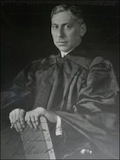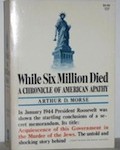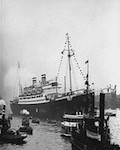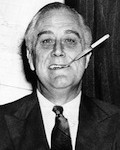Joseph Proskauer (1877-1971), who served as president of the American Jewish Committee during the 1940s, staunchly opposed any Jewish criticism of the Roosevelt administration’s refugee policy.
Raised in an assimilated German Jewish family in Alabama, Proskauer became a successful attorney and served on the New York State Supreme Court in the 1920s. After Adolf Hitler’s rise to power in 1933, Proskauer, as a member of the AJCommittee’s executive committee, opposed boycotting German goods or holding public protests against the persecution of German Jews. “For Jews in America, qua Jews, to demand any kind of political action is a negation of the fundamentals of American liberty equality,” he contended.
Behind the scenes, Proskauer occasionally contacted officials of the Roosevelt administration or members of Congress to express cautious hope that they might take steps to alleviate the mistreatment of Jews abroad.
Shortly after he was named president of the AJCommittee, in early 1943, Proskauer was also chosen as co-chairman, along with Rabbi Stephen S. Wise, of the newly-formed Joint Emergency Committee on European Jewish Affairs. He and Wise succeeded in overriding those within the Emergency Committee, such as the representatives of the Labor Zionists and the Jewish Labor Committee, who favored public protests against U.S. refugee policy.
Proskauer also was strongly anti-Zionist, which was the traditional position of the AJCommittee. He characterized the idea of a Jewish state as “a Jewish catastrophe.” He and his colleagues favored the admission of Jewish refugees to Palestine but refrained from actively pressing Allied leaders on the issue.
In 1945, Proskauer reported to other Jewish leaders that President Roosevelt, shortly before his death, had privately agreed with Proskauer that a Jewish state was “impossible to achieve” because of Arab opposition. That infuriated Rabbi Wise, who authored a letter denouncing Proskauer as a “congenital liar.” Wise then denied he wrote the letter, causing a bitter feud between the two men that lasted for several years.
Sources: Auerbach, Rabbis and Lawyers, pp.187-192;
Medoff, FDR and the Holocaust, pp.69-70.











